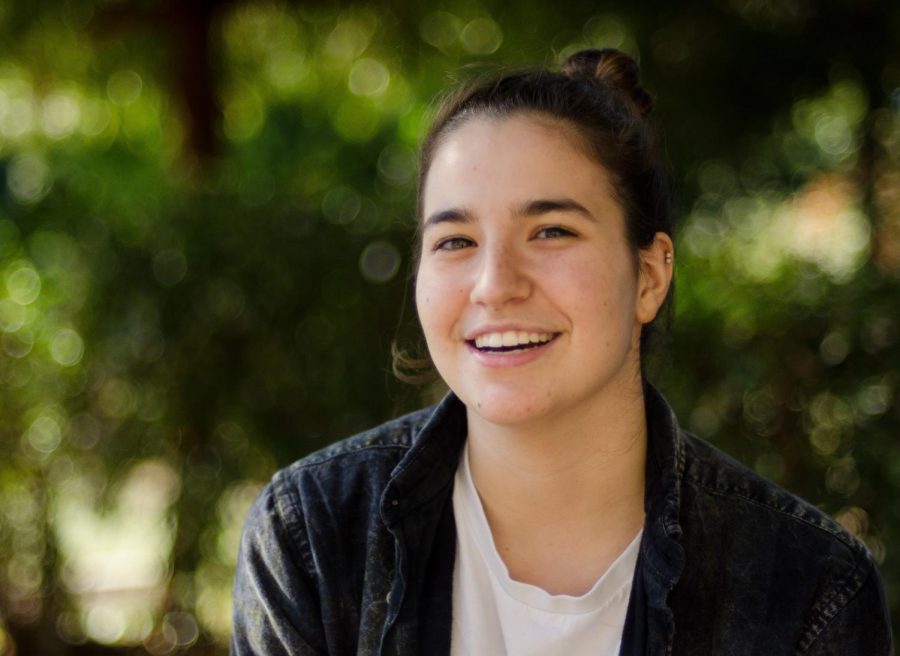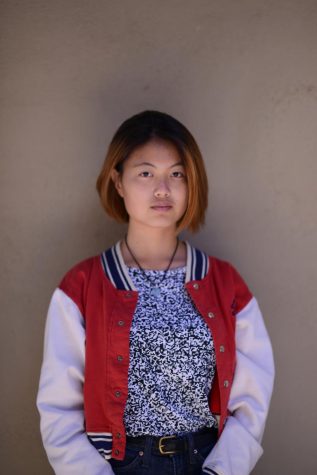Humans of Harker: Selin Sayiner takes charge of her identity
“I think it was the moment when I stopped saying what I wanted to be or what I was, when I stopped identifying with things that I did or who I was, that I was able to be a lot more than that,” Selin Sayiner (12) said. “How I define my family, or how I define my culture, or how I choose to define myself as a basketball player — rather than stuff like that, it became my choice. It was those moments where I decided that I could be what I wanted and do what I wanted, and it wasn’t based on any other definition of myself, that I could be the person I am now.”
December 7, 2017
Nike duffel bag slung over one shoulder, Selin Sayiner (12) navigates the hallways of Shah, starting conversations with just about anyone. Ask most seniors about Selin, and “basketball” is the first word that comes to mind. But she defines herself more broadly, attributing her open-minded character to her laid-back upbringing.
“[My parents] had a lot of value in learning about other people’s cultures and beliefs, but there was never an imposition of their beliefs, and I think that’s helped me have a better understanding of people around me,” she said. “I understood what they believed and I think that was really helpful in coming from one place to another.”
Selin’s voice carries a hint of a Southern drawl, as she lived in Texas until she was 12. And she looks the part — often wearing flannels and cowboy boots. Incidentally, she still retains her love of country music.
“It’s a big cultural thing, so that’s what I grew up listening to,” Selin said. “Everyone that I knew listened to country music, so that would became a backdrop for a lot of important moments in my life. Country music gets a bad reputation because it’s simple, but those are the stories of lives, and you can always connect with something like that. I like it because there’s a lot of upbeat songs.”
Though Selin’s cultural background plays a large part in her identity, she believes that her older sister Emma also played an important role.
“Oh my God, I love her,” Selin said of Emma, who is now a sophomore at UC Berkeley. “I have two sisters, but I’m really close to my sister Emma, because she’s two years older than me. She basically grew up with me, but she helped raise me a lot. All of the important moments in my life, anytime I had questions, I’d ask her.”
According to Selin, Emma pushed her to face problems head-on.
“She was always doing something,” Selin said. “Whether it was an activity or not, I admired her always going out for doing what she wanted. I remember her telling me that the first moment she realized she could control her life was when she asked if we could have a different tomato sauce. It was the most random thing. Everything she did for me growing up was an example that you can make a decision. Even if she’s never directly told me, she’s always the biggest example of taking control of your own life and making it what you want, and not being anyone else’s life to control.”
While most of her classmates know her for her outgoing personality, Selin says that she wasn’t always so comfortable talking to others.
“Oh God, I was such a shy kid,” she said. “I got really lucky that I didn’t hang out with a lot of people before I moved here. I realized that everyone’s kind of like that shy kid to begin with, and so if you’re the one that goes up to them or goes up to them and relate something with them, you’re building a relationship that you otherwise wouldn’t, and that’s always really beneficial. That’s how I met all my friends.”
Satchi Thockchom (12), Selin’s varsity basketball co-captain and close friend, described Selin’s personality as “bouncy.”
“Our conversations can go from really serious things to really random things, from politics to scouting teams that we’re playing to stupid things that our siblings did, or our dogs,” Satchi said. “It oscillates a lot. When’s she excited, she literally bounces off the walls, but you can also tell in her voice and the vibe you get that she’s really excited about something or passionate about something. She’s really aware of things in general. Politically, socially, and also in terms of how someone’s feeling.”
Ultimately, while Selin values her culture, she recognizes that she needs to shape her identity for herself.
“I think it was the moment when I stopped saying what I wanted to be or what I was, when I stopped identifying with things that I did or who I was, that I was able to be a lot more than that,” Selin said. “How I define my family, or how I define my culture, or how I choose to define myself as a basketball player — rather than stuff like that, it became my choice. It was those moments where I decided that I could be what I wanted and do what I wanted, and it wasn’t based on any other definition of myself, that I could be the person I am now.”


















![“[Building nerf blasters] became this outlet of creativity for me that hasn't been matched by anything else. The process [of] making a build complete to your desire is such a painstakingly difficult process, but I've had to learn from [the skills needed from] soldering to proper painting. There's so many different options for everything, if you think about it, it exists. The best part is [that] if it doesn't exist, you can build it yourself," Ishaan Parate said.](https://harkeraquila.com/wp-content/uploads/2022/08/DSC_8149-900x604.jpg)




![“When I came into high school, I was ready to be a follower. But DECA was a game changer for me. It helped me overcome my fear of public speaking, and it's played such a major role in who I've become today. To be able to successfully lead a chapter of 150 students, an officer team and be one of the upperclassmen I once really admired is something I'm [really] proud of,” Anvitha Tummala ('21) said.](https://harkeraquila.com/wp-content/uploads/2021/07/Screen-Shot-2021-07-25-at-9.50.05-AM-900x594.png)







![“I think getting up in the morning and having a sense of purpose [is exciting]. I think without a certain amount of drive, life is kind of obsolete and mundane, and I think having that every single day is what makes each day unique and kind of makes life exciting,” Neymika Jain (12) said.](https://harkeraquila.com/wp-content/uploads/2017/06/Screen-Shot-2017-06-03-at-4.54.16-PM.png)








![“My slogan is ‘slow feet, don’t eat, and I’m hungry.’ You need to run fast to get where you are–you aren't going to get those championships if you aren't fast,” Angel Cervantes (12) said. “I want to do well in school on my tests and in track and win championships for my team. I live by that, [and] I can do that anywhere: in the classroom or on the field.”](https://harkeraquila.com/wp-content/uploads/2018/06/DSC5146-900x601.jpg)
![“[Volleyball has] taught me how to fall correctly, and another thing it taught is that you don’t have to be the best at something to be good at it. If you just hit the ball in a smart way, then it still scores points and you’re good at it. You could be a background player and still make a much bigger impact on the team than you would think,” Anya Gert (’20) said.](https://harkeraquila.com/wp-content/uploads/2020/06/AnnaGert_JinTuan_HoHPhotoEdited-600x900.jpeg)

![“I'm not nearly there yet, but [my confidence has] definitely been getting better since I was pretty shy and timid coming into Harker my freshman year. I know that there's a lot of people that are really confident in what they do, and I really admire them. Everyone's so driven and that has really pushed me to kind of try to find my own place in high school and be more confident,” Alyssa Huang (’20) said.](https://harkeraquila.com/wp-content/uploads/2020/06/AlyssaHuang_EmilyChen_HoHPhoto-900x749.jpeg)











